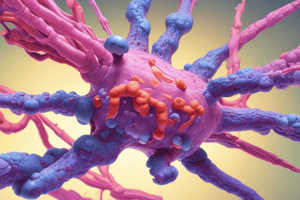Podcast
Questions and Answers
What is the main characteristic of monoclonal antibody preparations?
What is the main characteristic of monoclonal antibody preparations?
- They are produced in the laboratory and have multiple binding sites.
- They are only produced in response to viral infections.
- They consist of complex mixtures of different antibodies produced by many different B cell clones.
- They have a single type of antigen binding site, produced by a single B cell clone. (correct)
What is the term that refers to the strength of binding of a single epitope to a single antigen binding site?
What is the term that refers to the strength of binding of a single epitope to a single antigen binding site?
- Valence
- Avidity
- Antigenicity
- Affinity (correct)
What is the impact of valence on the strength of binding?
What is the impact of valence on the strength of binding?
- It increases the strength of binding. (correct)
- It decreases the strength of binding.
- It has no effect on the strength of binding.
- It is only relevant for multivalent antigens.
What is the term that refers to the cross-reactivity of antibodies with self-antigens?
What is the term that refers to the cross-reactivity of antibodies with self-antigens?
What is the primary function of neutralization in antibody functions?
What is the primary function of neutralization in antibody functions?
Which of the following IgG subclasses is most effective for complement activation?
Which of the following IgG subclasses is most effective for complement activation?
What is the function of antibody-dependent cellular cytotoxicity (ADCC)?
What is the function of antibody-dependent cellular cytotoxicity (ADCC)?
What is the percentage of total IgGs that are IgG?
What is the percentage of total IgGs that are IgG?
What is the primary function of immunoglobulins as membrane-bound molecules?
What is the primary function of immunoglobulins as membrane-bound molecules?
What is the characteristic of the constant region of heavy chains in immunoglobulins?
What is the characteristic of the constant region of heavy chains in immunoglobulins?
What is the difference between allotypic and isotopic determinants?
What is the difference between allotypic and isotopic determinants?
What determines the strength of an antibody-antigen interaction?
What determines the strength of an antibody-antigen interaction?
What is the term for the specific regions of a given antigen recognized by a lymphocyte?
What is the term for the specific regions of a given antigen recognized by a lymphocyte?
What is the characteristic of idiotypic determinants?
What is the characteristic of idiotypic determinants?
What is the main difference between polyclonal and monoclonal antibodies?
What is the main difference between polyclonal and monoclonal antibodies?
What is the characteristic of the antibody structure?
What is the characteristic of the antibody structure?
Study Notes
Immunoglobulins (Igs)
- Membrane-bound Igs act as antigen receptors, while soluble Igs participate in humoral immunity
- Igs have a heterogeneous structure, consisting of 2 identical light and 2 identical heavy chains
- Each heavy and light chain has a variable region (110 amino acids) and a constant region at the carboxy terminal
- Constant regions of heavy chains: μ, γ, δ, ε, α; light chains: κ, λ
Antibody Structure and Function
- Antibodies are flexible molecules that can bind to widely spaced or closely spaced cell surface determinants
- Isotypic determinants: antigenic determinants of constant regions that characterize classes and subclasses of heavy and light chains
- Allotypic determinants: slight variations in amino acid sequences in the constant regions due to allelic differences
- Idiotypic determinants: located in hypervariable regions, specific to antibodies with the same antigenic specificity
Antigen-Antibody Interactions
- Antigenic determinants: specific regions of a given antigen recognized by a lymphocyte
- Antibody-antigen complex is more stable than individual structures
- Quantitating antibody-antigen interactions: strength is determined by the sum of multiple non-covalent bonds
- Affinity refers to the strength of binding of a single epitope to a single antigen binding site
- Avidity: influenced by both affinity and valence of interaction (number of interacting binding sites)
Poly- and Monoclonal Antibodies
- Polyclonal antibodies: complex mixtures of different antibodies produced by many B cell clones
- Monoclonal antibodies: homogeneous preparations produced by a single B cell clone
Antibody Functions
- Neutralization: binding to pathogens to prevent infection
- Opsonization: marking pathogens for destruction by phagocytes
- Complement activation: triggering the complement system to lyse pathogens
- Agglutination: clumping together pathogens for removal
- Antibody-dependent cellular cytotoxicity (ADCC): recruiting immune cells to eliminate infected or abnormal cells
IgG Functions
- Most common Ig class (80% of total Igs)
- IgG1, IgG3, and IgG4 can cross the placenta
- IgG3 is most effective for complement activation
Studying That Suits You
Use AI to generate personalized quizzes and flashcards to suit your learning preferences.
Description
This quiz covers the structure and functions of immunoglobulins, including their role in humoral immunity, and the different types of heavy and light chains.



